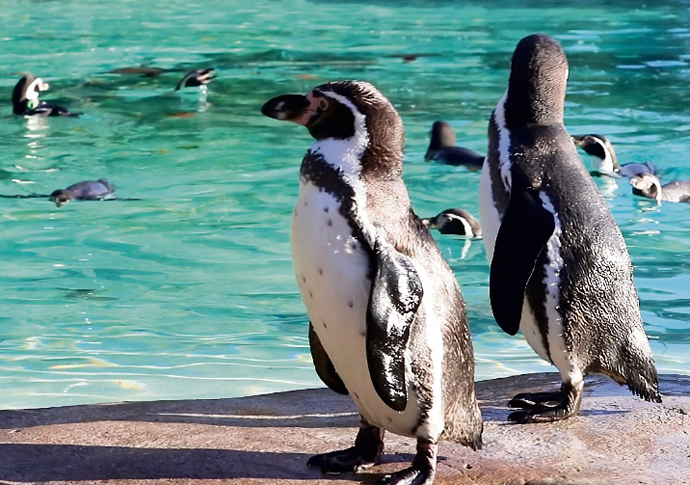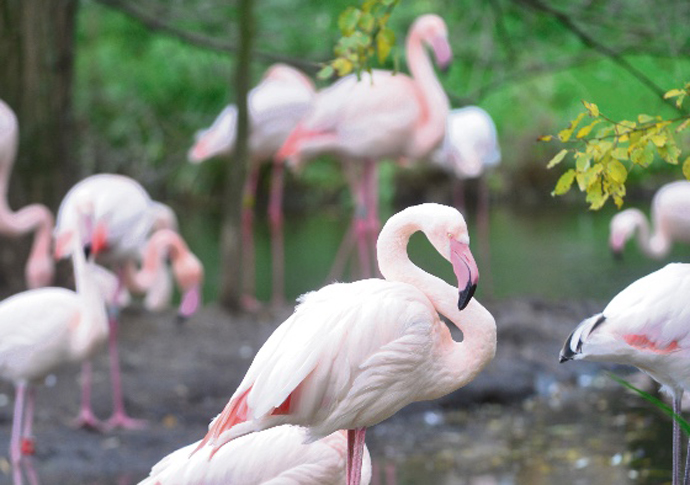Same-sex socialising at the pool
The Extra’s Caitlin Maskell gets the lowdown from keeper Jessica Ray on a range of fascinating behaviours of species at London Zoo
Friday, 14th February 2025 — By Caitlin Maskell

Ronnie and Reggie, above, were a couple… but now Reggie lives abroad [Photos © ZSL London Zoo]
WITH transitioning fish, courting flamingos and penguins having gay flings, same-sex animal couples are more common than you might think at London Zoo.
Penguin and flying birds keeper Jessica Ray told Extra about a fascinating range of behaviours, including same-sex pair bonding, cooperative parenting, and biological transformations.
Often the behaviours are part of how different species navigate survival, reproduction and bonding socially.
Ms Ray said: “There’s a huge diversity of social and reproductive strategies among the 10,000 species here at the zoo.
“Same-sex flamingo pairs are known to often court, build nests and sometimes raise chicks together.
“In some cases they may later form opposite-sex pairings or participate in cooperative parenting with another flamingo.
“Other species can change sex, such as our clownfish.

Same-sex flamingo pairs will sometimes raise chicks together; inset right, the clownfish can change sex
“In the group the largest individual is always female while the next in line remains male. If the female clownfish dies, the dominant male transitions to female to maintain the group structure ensuring the group can continue reproducing.”
Ms Ray said that arguably the most famous same-sex pair that London Zoo had were penguins that made headlines in 2014.
The two were “quickly inseparable,” she added: “Back in 2014 two of our male Humboldt penguins, Ronnie and Reggie got together and formed a same-sex penguin couple here on Penguin Beach.
“They showed the same sort of behaviours that all the other penguin couples did, preening each other, vocalising together and occupying a nest together…
“We started to see Ronnie and Reggie incubating pebbles as if they were eggs and they responded really well as a couple to a dummy egg we gave them. In 2015 we gave them an egg that had been abandoned by another penguin couple, so they could foster and raise the chick.
“This kind of egg-fostering is something that’s been seen in same-sex penguin pairs both in zoos and in the wild.

“Humboldt penguins form very strong pair bonds regardless of whether they’re male-female or same-sex and once bonded they follow the same instincts, defending their nest, incubating eggs and if they have a chick feeding and raising it together.
“This has also been observed in many penguin species from Humboldt penguins, to Gentoos and Kings as well.
“Penguins aren’t the only species of birds to demonstrate this kind of behaviour, flamingos, swans and even some vultures have been known to form long lasting sex-pairs.”
But the question is: Is Ronnie and Reggie’s romantic flame still lit?
Ms Ray said: “Since then their journeys have taken different paths. Humboldt penguins will often form new couples each spring as they enter their breeding season and Ronnie has actually paired with female penguins more recently and fathered a chick of his own last year.
“Reggie now lives at a zoo in the Netherlands where he moved to support their European breeding programme. He’s made loads of new mates and settled into his new home quickly.”